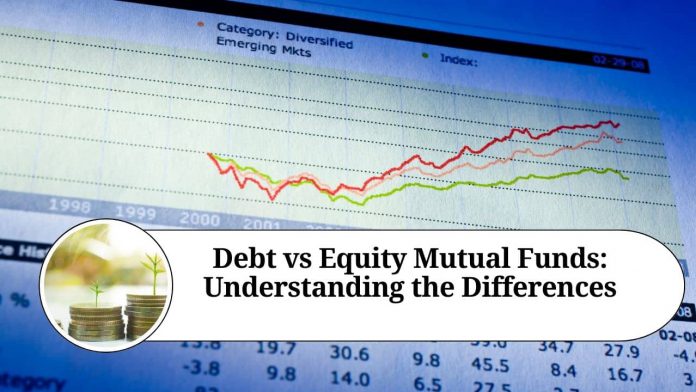Investing in mutual funds can be a great way to grow your wealth over time. However, with so many options available, it can be difficult to determine which types of funds are right for you. Two of the most common types of mutual funds are debt and equity funds. While both offer the potential for solid returns, they differ in terms of risk and investment strategy. In this blog, we’ll explore the differences between debt and equity mutual funds, and help you decide which type of fund is right for your investment goals.
Debt Mutual Funds
Debt mutual funds invest in fixed-income securities like bonds and treasury bills. These securities offer a fixed rate of return, making them a relatively low-risk investment. Debt funds are generally considered to be more stable than equity funds, and are ideal for investors who are looking for a steady stream of income. Debt funds are also a good option for investors who are risk-averse or nearing retirement and looking to protect their capital.
Equity Mutual Funds
Equity mutual funds, on the other hand, invest in stocks and other equity-related securities. These securities offer the potential for higher returns, but also come with higher risk. Equity funds are best suited for investors who are willing to take on more risk in exchange for potentially higher returns. Equity funds are ideal for investors with a longer time horizon, as they are more volatile and can experience significant fluctuations in value over shorter periods.
Key Differences Between Debt and Equity Funds
While both debt and equity funds offer potential for growth, they differ in several key ways:
Risk: Debt funds are generally considered to be less risky than equity funds, as they invest in fixed-income securities that offer a fixed rate of return. Equity funds, on the other hand, invest in stocks and other equity-related securities, which are more volatile and can experience significant fluctuations in value.
Returns: While debt funds offer a more stable, consistent rate of return, equity funds offer the potential for higher returns over the long term.
Investment Strategy: Debt funds are ideal for investors who are looking for a steady stream of income or who are risk-averse. Equity funds, on the other hand, are best suited for investors who are willing to take on more risk in exchange for potentially higher returns.
Tax Implications: Debt funds are taxed differently than equity funds. While debt funds are subject to capital gains tax, they are taxed at a lower rate than equity funds.
Choosing the Right Fund for Your Investment Goals
Choosing between debt and equity mutual funds ultimately comes down to your investment goals and risk tolerance. If you’re looking for a stable, low-risk investment with a steady stream of income, debt funds may be the right choice for you. If you’re willing to take on more risk in exchange for potentially higher returns over the long term, equity funds may be the better option.
Conclusion
It’s important to remember that all investments come with some degree of risk, and it’s important to do your research and consult with a financial advisor before making any investment decisions. By understanding the differences between debt and equity mutual funds, you can make an informed decision that aligns with your investment goals and risk tolerance.
Other Related Blogs: Section 144B Income Tax Act
Frequently Asked Questions (FAQs)
Q: What is a debt mutual fund?
A: A debt mutual fund invests in fixed-income securities like bonds, treasury bills, and other debt-related instruments. These funds offer a relatively low-risk investment with a stable rate of return.
Q: What is an equity mutual fund?
A: An equity mutual fund invests in stocks and other equity-related securities. These funds offer the potential for higher returns over the long term, but also come with higher risk.
Q: What is the difference between debt and equity mutual funds?
A: Debt funds invest in fixed-income securities and offer a lower risk, while equity funds invest in stocks and other equity-related securities and offer the potential for higher returns over the long term, but with a higher risk.
Q: What are the risks associated with debt mutual funds?
A: While debt mutual funds are considered to be less risky than equity funds, they are still subject to credit risk, interest rate risk, and liquidity risk.
Q: What are the risks associated with equity mutual funds?
A: Equity mutual funds are subject to market risk, meaning that the value of the fund can fluctuate significantly based on market conditions.
Q: Which is better – debt or equity mutual funds?
A: The choice between debt and equity mutual funds ultimately comes down to your investment goals and risk tolerance. If you’re looking for a stable, low-risk investment with a steady stream of income, debt funds may be the right choice for you. If you’re willing to take on more risk in exchange for potentially higher returns over the long term, equity funds may be the better option.
Q: What are the tax implications of investing in debt or equity mutual funds?
A: Debt funds are subject to capital gains tax, but are taxed at a lower rate than equity funds. Equity funds are subject to both capital gains tax and dividend tax.
Q: Can I switch between debt and equity mutual funds?
A: Yes, you can switch between debt and equity mutual funds. However, it’s important to consider the potential impact on your investment goals and risk tolerance before making any changes.
Q: Should I invest in both debt and equity mutual funds?
A: It’s generally a good idea to diversify your portfolio with a mix of both debt and equity mutual funds. This can help to spread out your risk and potentially maximize returns over the long term.




















